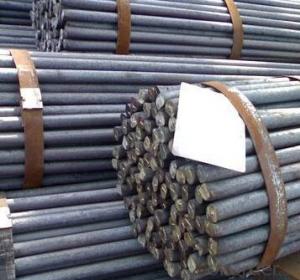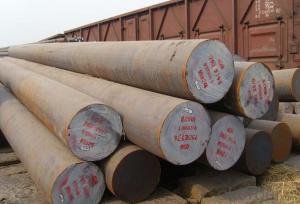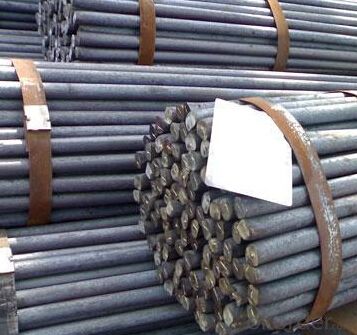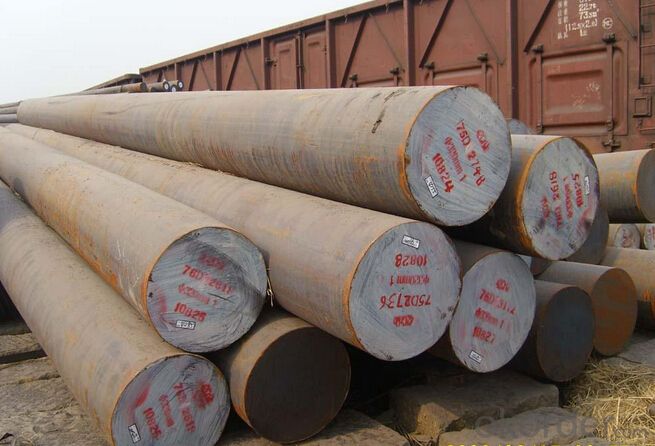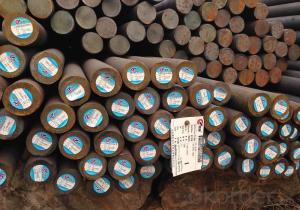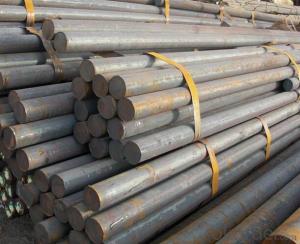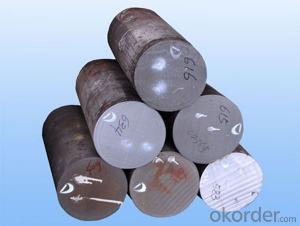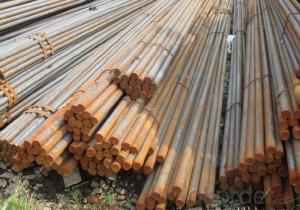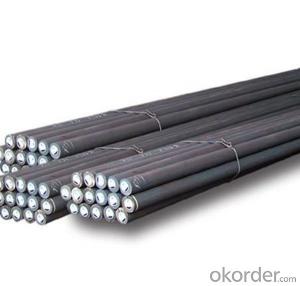Special Steel 42CrMo/1.7225 Working Mould Steel
- Loading Port:
- China main port
- Payment Terms:
- TT or LC
- Min Order Qty:
- 25 m.t.
- Supply Capability:
- 10000 m.t./month
OKorder Service Pledge
OKorder Financial Service
You Might Also Like
Specification
The details of our Steel
1. Produce Standard: as the GB, AISI, ASTM, SAE, EN, BS, DIN, JIS Industry Standard
2. Produce processes: Smelt Iron -EAF smelt Billet - ESR smelt Billet -Hot rolled or forged get the steel round bar and plate
3. Heat treatment:
Normalized / Annealed / Quenched+Tempered
4. Quality assurance:
All order we can received Third party inspection, You can let SGS, BV,.. and others test company test and inspect our products before Goods shipping.
Product information
Chemical Composition(%)
C | Si | Mn | Cr | Mo | Ni | P | S |
0.38-0.45 | 0.17-0.37 | 0.50-0.80 | 0.90-1.20 | 0.15-0.25 | ≤0.030 | ≤0.030 | ≤0.030 |
Standard
GB | AISI | DIN | JIS | ISO |
42CrMo | 4140 | 42CrMo4 | SCM440 | 42CrMo4 |
Available Size
Rolled round bar | φ20-120mm × L |
Forged round bar | φ130-195mm × L |
Heat Treatment
Item | Temperature℃ | Hardness |
quenching | 840-880 | HRC32-34 |
tempering | 580 | |
quenching | 900 | HRC54-60 |
tempering | 150-180 |
Applications: The steel is suitable for manufacturing requires a certain strength and toughness of large and medium-sized plastic mold
Product show

Workshop show

- Q: What are the different methods of surface lapping for special steel?
- There are several different methods of surface lapping for special steel. These methods are used to achieve a high level of flatness and smoothness on the surface of the steel. One common method is called free abrasive lapping. In this method, a slurry containing abrasive particles is used to polish the surface of the steel. The slurry is typically applied to a rotating lap plate, which is then pressed against the steel surface. The abrasive particles remove material from the surface, resulting in a smoother and flatter surface. Another method is called fixed abrasive lapping. In this method, a rigid lap plate with abrasive particles embedded in it is used to polish the steel surface. The lap plate is typically made of a harder material than the steel being lapped. As the lap plate rotates and is pressed against the steel surface, the embedded abrasive particles remove material, resulting in a smoother surface. Chemical lapping is another method that can be used for special steel. In this method, a chemical solution is applied to the steel surface. The chemical solution reacts with the surface of the steel, dissolving and removing a thin layer of material. This method is often used when a high level of flatness is required. Ultrasonic lapping is a method that uses ultrasonic vibrations to enhance the lapping process. In this method, the steel surface is placed in contact with a bath of abrasive particles and a liquid medium. Ultrasonic vibrations are then applied to the liquid medium, causing the abrasive particles to vibrate and remove material from the surface of the steel. This method can be particularly effective for lapping hard and brittle materials. Overall, the different methods of surface lapping for special steel offer various approaches to achieve the desired level of flatness and smoothness. The selection of the method depends on factors such as the type of steel, the desired surface finish, and the specific requirements of the application.
- Q: What are the different methods for improving the fatigue strength of special steel?
- There are various methods for improving the fatigue strength of special steel, including surface treatments such as shot peening, nitriding, and carburizing. Heat treatments like quenching and tempering can also enhance fatigue strength. Additionally, alloying elements can be added to the steel composition to improve its resistance to fatigue. Lastly, optimizing the steel's microstructure through processes like grain refinement and precipitation hardening can contribute to increased fatigue strength.
- Q: What are the advantages of using special steel in industrial applications?
- There are several advantages of using special steel in industrial applications. Firstly, special steel offers exceptional strength and durability, making it suitable for heavy-duty tasks. The unique composition and manufacturing process of special steel result in a material that can withstand high levels of stress, extreme temperatures, and harsh environmental conditions. This makes it ideal for industries such as construction, automotive, and manufacturing, where reliable and long-lasting materials are required. Secondly, special steel exhibits excellent corrosion resistance. It can resist the damaging effects of moisture, chemicals, and other corrosive agents, which is crucial in industries like marine, oil and gas, and chemical processing. The corrosion resistance of special steel reduces the need for frequent maintenance and replacement, saving both time and costs for industrial applications. Furthermore, special steel offers superior machinability and formability. It can be easily shaped, cut, and welded to meet specific design requirements. This versatility allows for complex and intricate designs in various industrial applications, including machinery, tools, and equipment. Another advantage of special steel is its ability to maintain its properties at high temperatures. It has excellent heat resistance, ensuring that it remains strong and stable even under extreme heat conditions. This makes special steel suitable for applications involving high-temperature environments, such as aerospace, power generation, and furnace components. Additionally, special steel can exhibit excellent wear resistance and hardness. It can withstand abrasion, friction, and impact, making it ideal for applications where materials are subjected to heavy wear and tear, such as mining, construction equipment, and cutting tools. The wear resistance of special steel ensures that components have a longer lifespan and require less frequent replacement. In conclusion, the advantages of using special steel in industrial applications include exceptional strength and durability, corrosion resistance, machinability and formability, heat resistance, and wear resistance. These properties make special steel a preferred choice for a wide range of industries, contributing to improved performance, longevity, and cost-effectiveness.
- Q: How does spring steel maintain its elasticity?
- Spring steel maintains its elasticity due to its unique composition and manufacturing process. It is made from a high carbon steel alloy that undergoes heat treatment and quenching, which gives it its exceptional strength and flexibility. This heat treatment process called tempering allows the steel to retain its shape and bounce back to its original form after being deformed or subjected to external forces. The carbon content in spring steel also contributes to its elasticity by providing increased hardness and resistance to deformation. Overall, the combination of high carbon content, heat treatment, and quenching make spring steel highly durable and able to maintain its elasticity over extended periods of use.
- Q: How does special steel contribute to reducing greenhouse gas emissions?
- Special steel can contribute to reducing greenhouse gas emissions in several ways. Firstly, it can be used in the manufacturing of more energy-efficient vehicles, which emit lower levels of carbon dioxide during operation. Additionally, special steel can be utilized in the production of renewable energy infrastructure, such as wind turbines and solar panels, which helps reduce reliance on fossil fuels. Furthermore, special steel is often employed in the construction of energy-efficient buildings, which require less energy for heating and cooling, thus lowering overall emissions. Overall, the use of special steel in various applications plays a significant role in the reduction of greenhouse gas emissions and the transition to a more sustainable future.
- Q: Can special steel be used in the power generation industry?
- Yes, special steel can be used in the power generation industry. Special steel alloys are often used for critical applications such as turbine blades, rotors, and other components in power plants. These steels possess high strength, resistance to corrosion, and heat resistance, making them suitable for the harsh operating conditions and high temperatures found in power generation equipment.
- Q: How is special steel used in the medical supply chain?
- Special steel is used in the medical supply chain for a variety of applications. It is utilized in the manufacturing of surgical instruments, implantable devices, and medical equipment due to its high strength, corrosion resistance, and biocompatibility. Special steel ensures the durability and reliability of these critical medical supplies, contributing to the safety and effectiveness of healthcare procedures and treatments.
- Q: How does special steel contribute to the medical industry?
- Special steel plays a crucial role in the medical industry by offering a range of desirable properties such as high strength, corrosion resistance, and biocompatibility. It is extensively utilized in the manufacturing of medical devices and surgical instruments, ensuring their durability, precision, and sterility. From implants and prosthetics to surgical tools and equipment, special steel enables advancements in medical treatments, enhancing patient outcomes and improving overall healthcare.
- Q: How does special steel contribute to the manufacturing of defense equipment?
- Special steel plays a crucial role in the manufacturing of defense equipment due to its unique properties and characteristics. Firstly, special steel is known for its exceptional strength and durability, making it ideal for constructing various components of defense equipment. This high strength allows for the production of lightweight yet robust structures, enabling the development of advanced weaponry and protective gear. Moreover, special steel possesses excellent resistance to corrosion and wear, making it resistant to the harsh conditions faced by defense equipment in various environments. This resistance to corrosion ensures that the equipment remains functional and reliable even in extreme conditions, such as exposure to saltwater or acidic environments. Additionally, special steel offers exceptional heat resistance, which is crucial for defense equipment such as missile casings or jet engine components. Its ability to withstand high temperatures without losing its integrity or mechanical properties allows for the creation of more efficient and powerful defense systems. Furthermore, special steel can be tailored to meet specific requirements, enabling the manufacturing of customized defense equipment. It can be alloyed with various elements to enhance specific characteristics, such as increased hardness, improved magnetic properties, or better resistance to impact. This versatility allows for the production of defense equipment that meets the exact needs of military applications, enhancing their overall performance. In summary, special steel contributes significantly to the manufacturing of defense equipment by providing exceptional strength, resistance to corrosion and wear, heat resistance, and customization options. These properties enable the creation of more advanced, reliable, and efficient defense systems that meet the demanding requirements of modern military operations.
- Q: How does special steel contribute to the defense sector?
- Special steel contributes to the defense sector in several ways. Firstly, it is used in the production of military vehicles, aircraft, and naval vessels, providing strength, durability, and resistance to extreme conditions. Secondly, special steel is utilized in the manufacturing of ballistic armor and bulletproof vests, offering enhanced protection to military personnel. Additionally, it is used in the construction of weaponry, such as firearms and artillery, ensuring reliability and precision. Overall, special steel plays a crucial role in enhancing the capabilities and safety of defense equipment and personnel.
Send your message to us
Special Steel 42CrMo/1.7225 Working Mould Steel
- Loading Port:
- China main port
- Payment Terms:
- TT or LC
- Min Order Qty:
- 25 m.t.
- Supply Capability:
- 10000 m.t./month
OKorder Service Pledge
OKorder Financial Service
Similar products
Hot products
Hot Searches
Related keywords
